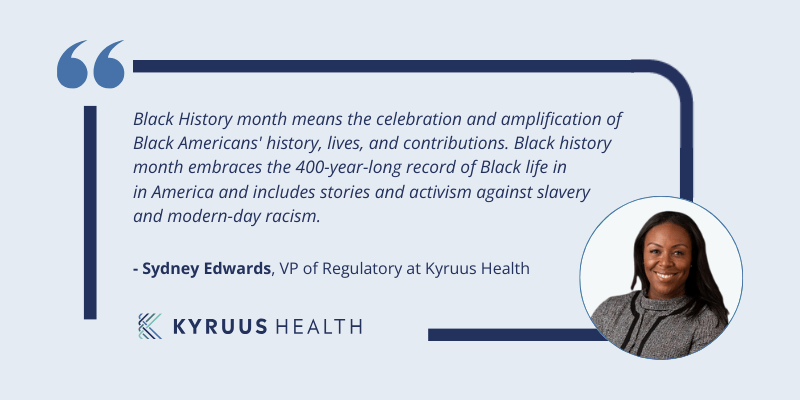Introducing the latest chapter in our “Celebrating Diversity: Voices from our Kyruus Health Community” series, we turn our attention to Sydney Edwards, Vice President of Regulatory at Kyruus Health.
With a wealth of experience shaping healthcare policy and navigating regulatory landscapes, Sydney brings a unique perspective to the intersection of diversity and healthcare access. As a proud graduate of two Historically Black Colleges and Universities (HBCUs), Sydney emphasizes the importance of equitable funding for these institutions and shares her passion for addressing historical underfunding challenges.
Explore Sydney’s thoughts on the significance of Black History Month, as she highlights the celebration and amplification of Black Americans’ history, lives, and contributions. Moreover, gain valuable insights into her perspective on the role of care access in achieving better health outcomes for the Black community and the significant gaps that must be addressed to achieve more equitable care. Join us in celebrating Sydney Edwards and her invaluable contributions to the ongoing dialogue on diversity and healthcare.
Sydney Edwards
Vice President of Regulatory, Kyruus Health
Tell us a bit about your background and the story of how you came to be connected to Kyruus Health?
I am Vice President of Regulatory at Kyruus Health, where I provide oversight and ownership for all regulatory matters and am responsible for developing, monitoring, and executing on overall corporate regulatory and compliance initiatives.
Prior to Kyruus Health, I was Vice President of Healthcare Policy Research at Capstone, advising private equity firms on the impact of regulation on healthcare organizations within their portfolio and related transactions. Previously, I served as an Attorney Advisor for the U.S. Department of Health and Human Services, investigating and auditing a comprehensive range of complex healthcare fraud, including Medicare, Medicaid, and other government and private payers.
I was also Assistant Counsel for the U.S. Senate Sergeant at Arms Office of the General Counsel, supporting regulatory compliance on Capitol grounds and all Senate buildings. I am a graduate of Texas Southern University School of Law and Hampton University.
What is something about you that you would want others to know more about?
I am a proud graduate of two Historically Black Colleges and Universities (“HBCUs”), Hampton University and Thurgood Marshall School of Law (Texas Southern University).
Throughout their 150-year history, HBCUs have experienced a history of public underfunding compared to other colleges and universities. One result of this historical underfunding is vast inequities in endowments. Many HBCUs are at the mercy of annual federal appropriations funding through Title III, Part B of the Higher Education Act, which can engender an apprehension of potentially losing a vital source of financial support. Funding endowments would lift the financial burden off HBCUs and provide them with the support to offer scholarships to prospective students, improve and maintain facilities, pursue research initiatives, or expand and improve academic programs.

From your perspective, what does celebrating Black History Month mean to you?
Black History month means the celebration and amplification of Black Americans’ history, lives, and contributions. Black history month embraces the 400-year-long record of Black life in America and includes stories and activism against slavery and modern-day racism.
How do you perceive the role of care access in health for the Black community?
In the U.S., Black adults encounter a range of factors, including access to care barriers, environmental problems and less-advanced care from healthcare providers — contributing to worse health outcomes.
According to PEW data, a majority of Black adults say less access to quality medical care where they live is a major reason why Black people in the U.S. generally have worse health outcomes than other adults. With this data in mind, the role of care access in health for the Black community is integral to achieving better health outcomes overall and decreasing health disparities spurned by social determinants of health. Social determinants of health such as unequal access to healthcare, lack of education, stigma, and racism are linked to health disparities; these factors can be addressed in part by improving the quality of care access in the Black community.
What are the most significant gaps that must be addressed to achieve more equitable care?
Health equity, or equitable care, describes an ideal state where each individual has a fair and just opportunity to attain and maintain their highest level of health. Achieving this requires focused and ongoing societal and regulatory efforts to address historical and contemporary injustices; overcome economic, social, and other obstacles to health and healthcare; and eliminate preventable health disparities.

